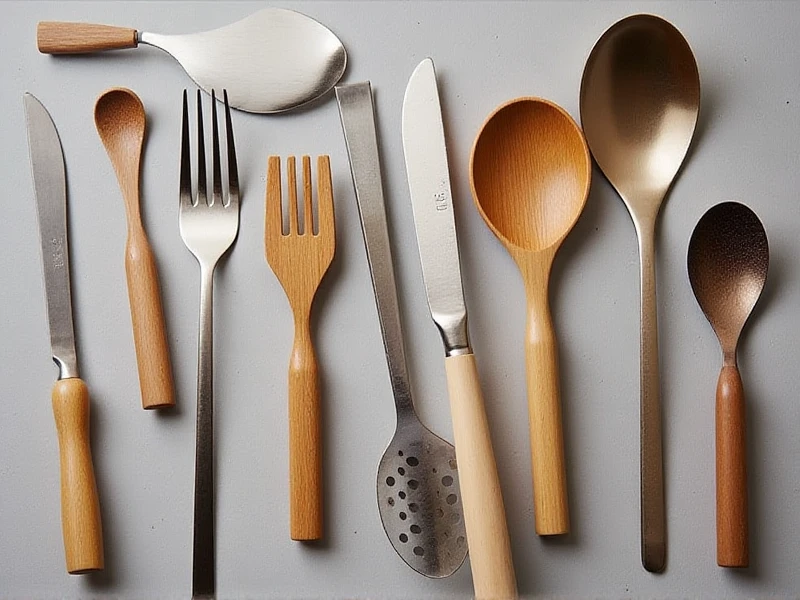The Ultimate Guide to Choosing Perfect Utensils for Your Kitchen
2025-06-05

High-quality utensils transform cooking from a chore into an art form. Selecting the right tools impacts flavor, efficiency, and even safety in your kitchen. Whether you're a professional chef or a home cook, understanding utensil essentials elevates every meal. Let's explore how to build the ultimate collection.
Why Quality Utensils Matter
Durable utensils prevent common kitchen disasters. Flimsy spatulas melt on hot pans, cheap peelers bruise produce, and unstable knives cause injuries. Premium options like stainless steel tools resist corrosion, while heat-resistant silicone spoons withstand high temps without warping. Investing $20-$50 per item pays off in longevity – proper care makes them last decades.
Essential Utensils for Every Kitchen
1. Cutting Implements: Chef's knives (8-inch) and paring knives are non-negotiables. Opt for forged German steel over stamped alternatives. Serrated bread knives and sturdy kitchen shears complete core slicing tools.
2. Mixing & Serving: Wooden spoons prevent scratches on non-stick surfaces. Slotted spoons drain excess liquid, while solid ladles handle soups. Nylon turners flip delicate foods without sticking.
3. Specialized Gear: Offset spatulas frost cakes cleanly, fish turners slide under filets intact, and spider skimmers retrieve foods from boiling oil. Don't ignore microplanes for zesting or garlic presses for efficiency.
Material Breakdown: Smart Selection
- Stainless Steel: Ideal for ladles, slotted spoons, and whisks. Dishwasher-safe and non-reactive with acidic foods.
- Silicone: Heatproof up to 450°F, perfect for spatulas and oven mitts. Look for FDA-approved food-grade options.
- Wood: Naturally antibacterial; best for cutting boards and spoons. Requires hand-washing and occasional oiling.
- Nylon: Scratch-resistant alternative for non-stick cookware. Ensure reinforced cores to prevent bending.
Avoid aluminum utensils with tomato-based sauces (causes metallic taste) and cheap plastic that stains or cracks. Bamboo tools offer eco-friendly benefits but demand meticulous drying to prevent mold.
Pro Tips for Care & Organization
Extend utensil lifespan with simple habits:
- Handwash wooden items immediately after use.
- Store knives on magnetic strips or in-block – never loose in drawers.
- Sanitize cutting boards monthly with vinegar-water solutions.
- Organize by frequency of use: Hang everyday spatulas and tongs, and store seasonal tools like turkey lifters in labeled bins.
Renowned kitchens like those in Michelin-starred restaurants follow the "five-minute rule": Any utensil needed within five seconds should be reachable without moving your feet.
Sustainable Choices
Eco-conscious brands now produce utensils from recycled steel or fast-growing acacia wood. Silicone tools reduce single-use plastic waste, while compostable bamboo options decompose naturally. Look for Fair Trade certifications when buying artisan-made pieces.
Upgrade gradually instead of replacing entire sets. A well-chosen $40 knife outperforms a $200 block-set’s filler pieces. Check local culinary shops for heirloom-quality finds.
Final Thoughts
Exceptional cooking begins with trusted utensils that feel like extensions of your hands. Prioritize ergonomics – handles should nest comfortably in your grip. Remember: One impeccably sharpened knife creates better results than ten mediocre blades. Start with three foundational items: a chef's knife, wooden spoon, and sturdy tongs. Build your collection intentionally, and you'll craft meals with confidence for years.
Ready to refresh your toolkit? Explore curated collections designed by professional chefs – because extraordinary dishes require extraordinary tools. Browse now and upgrade your next culinary masterpiece.
Category: